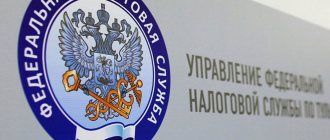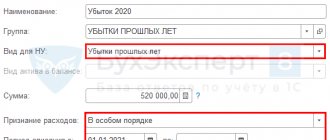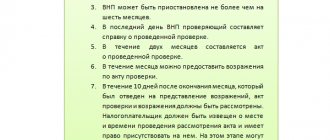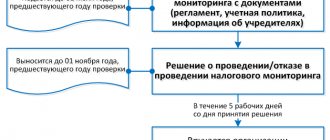1. Seizure of property as a method of ensuring the execution of a decision to collect taxes, penalties and fines is recognized as the action of a tax or customs authority with the sanction of a prosecutor to restrict the ownership rights of a taxpayer-organization in relation to its property.
Property is seized if the taxpayer-organization fails to fulfill the obligation to pay taxes, penalties and fines within the established time frame and if the tax or customs authorities have sufficient grounds to believe that the specified person will take measures to escape or conceal his property.
2. The seizure of property can be complete or partial.
A complete seizure of property is recognized as such a restriction of the rights of a taxpayer-organization in relation to his property, in which he does not have the right to dispose of the seized property, and the possession and use of this property is carried out with the permission and under the control of the tax or customs authority.
Partial seizure is recognized as such a restriction of the rights of a taxpayer-organization in relation to its property, in which the possession, use and disposal of this property is carried out with the permission and under the control of the tax or customs authority.
3. An arrest may be applied only to ensure the fulfillment of the obligation to pay a tax, penalty, or fine at the expense of the property of a taxpayer-organization not earlier than the tax authority makes a decision to collect the tax, penalty, or fine in accordance with an article of this Code and in the event of insufficiency or absence of funds on the accounts of the taxpayer-organization or its electronic funds, or in the absence of information about the accounts of the taxpayer-organization or information about the details of its corporate electronic means of payment used for transfers of electronic funds.
3.1. In order to ensure the fulfillment of obligations to pay taxes and fees, penalties and fines by the party to the investment partnership agreement - the managing partner responsible for maintaining tax records (hereinafter in this article - the managing partner responsible for maintaining tax records), in connection with the implementation of the investment partnership agreement (with the exception of corporate income tax arising in connection with the participation of a given partner in an investment partnership agreement), the common property of the partners, as well as the property of all managing partners, may be seized.
The decision to seize can be made in relation to the common property of the partners, and in the absence or insufficiency of such property, in relation to the property of all managing partners (in this case, first of all, such a decision is made in relation to the property of the managing partner responsible for maintaining tax records).
The decision to seize the common property of the partners is made by the head (deputy head) of the authorized tax authority.
The decision to seize the common property of the partners and the property of the managing partners may be made no earlier than the decision to collect taxes, penalties, fines in accordance with an article of this Code and in the event of insufficient or absent funds in the accounts of the investment partnership, persons who are managing partners, or in the absence of information about the accounts of these persons.
4. Seizure may be imposed on all property of the taxpayer-organization.
5. Only that property that is necessary and sufficient to fulfill the obligation to pay taxes, penalties and fines is subject to seizure.
A seizure of an object of real estate of a foreign organization that does not carry out activities in the Russian Federation through a permanent representative office, if the value of the specified object of real estate exceeds the amounts of taxes, penalties and fines collected in relation to this object, is imposed if the foreign organization does not have other property on the territory of the Russian Federation , which may be subject to foreclosure.
6. The decision to seize the property of a taxpayer-organization is made by the head (his deputy) of the tax or customs authority in the form of a corresponding resolution.
7. The seizure of the property of a taxpayer-organization is carried out with the participation of witnesses. The body seizing property does not have the right to refuse the taxpayer-organization (its legal and (or) authorized representative) to be present during the seizure of property.
Persons participating in the seizure of property as witnesses, specialists, as well as the taxpayer-organization (his representative), are explained their rights and obligations.
8. Seizure of property at night is not permitted, except in urgent cases.
9. Before seizing property, the officials carrying out the seizure are required to present to the taxpayer-organization (its representative) the decision to seize, the prosecutor’s sanction and documents certifying their authority.
10. When making an arrest, a protocol on the seizure of property is drawn up. This protocol or the inventory attached to it lists and describes the property subject to seizure, with a precise indication of the name, quantity and individual characteristics of the items, and, if possible, their value.
All items subject to seizure are presented to witnesses and the taxpayer-organization (its representative).
11. The head (his deputy) of the tax or customs authority, who issued a resolution to seize property, determines the place where the property that has been seized should be located.
12. Alienation (except for those carried out under the control or with the permission of the tax or customs authority that applied the seizure), embezzlement or concealment of property that has been seized is not allowed. Failure to comply with the established procedure for the possession, use and disposal of property that has been seized is grounds for bringing the perpetrators to justice under Article 125 of this Code and (or) other federal laws.
12.1. At the request of a taxpayer-organization in respect of which a decision was made to seize property, the tax authority has the right to decide to replace the seizure of property with:
1) a bank guarantee confirming that the bank undertakes to pay the amount of arrears specified in the decision to collect taxes, penalties and fines, as well as the amount of corresponding penalties and fines in the event of failure to pay these amounts by the principal within the period established by the tax authority, meeting the requirements established by Article 74.1 of this Code;
2) a pledge of property of a taxpayer-organization, formalized in accordance with paragraph 2 of Article of this Code;
3) a guarantee of a third party, drawn up in the manner prescribed by article of this Code.
For the purposes of this subparagraph, the guarantor must meet the requirements established by paragraph 2.1 of Article 176.1 of this Code.
13. The decision to seize property is canceled by an authorized official of the tax or customs authority when the obligation to pay taxes, penalties and fines is terminated or a decision is made to replace the seizure of property in accordance with paragraph 12.1 of this article.
The decision to seize property is valid from the moment of seizure until the cancellation of this decision by the authorized official of the tax or customs authority who made such a decision, or until the cancellation of this decision by a higher tax or customs authority or court.
The tax (customs) authority notifies the taxpayer of the cancellation of the decision to seize property within five days after the date of adoption of this decision.
From the moment the property is recognized as pledged by the tax authority, the seizure previously imposed on this property ceases.
14. The rules of this article also apply to the seizure of the property of a tax agent - an organization and a fee payer, an insurance premium payer - an organization and a responsible participant in a consolidated group of taxpayers.
15. The rules established by this article are applied taking into account the specifics provided for by this paragraph in relation to ensuring the payment of corporate income tax for a consolidated group of taxpayers.
The seizure of the property of participants in a consolidated group of taxpayers is carried out in the same sequence in which the tax authority carries out the procedure for foreclosure on the property of a taxpayer in accordance with paragraph 11 of Article of this Code.
- Article 76. Suspension of transactions on bank accounts, as well as transfers of electronic funds of organizations and individual entrepreneurs
- Article 78. Offset or refund of amounts of overpaid taxes, fees, insurance premiums, penalties, fines
Commentary to Art. 77 Tax Code of the Russian Federation
Seizure of property - an inventory of property and a ban on its disposal.
1. Paragraph 1 of the commented article of the Tax Code defines the seizure of property - another way to ensure the payment of taxes and fees:
a) seizure of property is an action of a tax or customs (in relation to taxes and fees payable in connection with the movement of goods across the customs border of the Russian Federation) authority, which:
- carried out with the sanction of the prosecutor. The latter circumstance ensures the legality and validity of the seizure, the protection of the interests of the property owner from unlawful restrictions on his rights, as well as the adoption of timely and comprehensive measures to prevent or eliminate facts of unlawful actions of tax and customs authorities and eliminate their consequences;
- aimed at limiting the property rights of the taxpayer, fee payer, tax agent, which are organizations (hereinafter referred to as tax payers). Such a restriction may include:
1) to exercise the right to own and use property;
2) only to the exercise of the right to dispose of property;
3) to all three powers of the owner - possession, use, disposal of property;
b) seizure of property is an independent way of ensuring the payment of taxes. It is necessary to very clearly imagine and understand the differences between the seizure of property and a pledge, and from a guarantee (the latter are used when changing the deadlines for paying taxes), and from the suspension of transactions on the bank accounts of taxpayers and fees (this method only ensures the forced collection of taxes and fees).
In what cases, or rather, what conditions are necessary for the legal and justified use of seizure of property?
It is produced under the following conditions:
1) failure by the payer to fulfill his tax obligations within the time limits established by law or amended in accordance with Articles 61 - 67 of the Tax Code of the Russian Federation;
2) when the tax (customs) authority has sufficient grounds to believe that the tax payer will take any action to escape. In this case, we are talking about any actions of the payer that give reason to believe this, for example, purchasing a travel ticket to travel to another city, obtaining a foreign passport, applying for the acquisition of citizenship of another country or the right to permanent residence in this country, systematic evasion of appearing in tax (customs) authorities, etc.;
3) when there are sufficient grounds to assume that the taxpayer is taking actions to conceal his property. For example, he placed an advertisement for an urgent sale of property, transported it to another warehouse, the location of which was unknown to the tax (customs) authority, and re-registered the property to dummies. At the same time, the property mentioned in Article 77 of the Tax Code of the Russian Federation must be understood as things, securities, vehicles, real estate, other property (we talked about this in detail with you in the commentary to Article 47 of the Tax Code of the Russian Federation), owned by the payer by right of ownership or other property rights;
c) seizure of property is also used as a way to ensure the execution of a decision to collect taxes (Article 47 of the Tax Code of the Russian Federation). In other words, the seizure of property ensures the execution of:
and obligations to pay taxes when deadlines change (as a pledge and surety, Articles 73, 74 of the Tax Code of the Russian Federation);
and such an obligation in case of violation of the deadlines established by the legislation on taxes and fees (as a fine, Article 75 of the Tax Code of the Russian Federation);
and decisions on collection (such as suspension of transactions on bank accounts of tax payers, Article 76 of the Tax Code of the Russian Federation).
2. In paragraph 2 of the commented article, the legislator classifies the types of seizure of property.
So, there are two types of seizure of property:
a) complete seizure of property is such a restriction of the rights of the payer of taxes and fees in which he:
- has absolutely no right to dispose of the seized property. That is, this right of the owner is paralyzed: the latter does not have the right to sell the property, donate it, lease it, transfer it as a contribution to a commercial organization or a simple partnership, or make any other transaction aimed at alienating this property;
- may exercise the powers of ownership or use of seized property (for example, travel in your car, use machine tools in the production process, etc.), but only with the written permission of the tax (customs) authority and under its control;
b) partial seizure of property is such a restriction of the rights of the tax payer in which, with the permission and under the control of the tax (customs) authority, all three powers of the owner are exercised.
A tax payer, for example, may receive the right to sell certain types, lots, or parts of property in order to pay taxes on the proceeds.
3. Paragraph 3 of Article 77 of the commented Code is of a referential nature:
a) allows the use of property seizure to ensure the collection of taxes only at the expense of the property (Article 47 of the Tax Code of the Russian Federation) of the tax payer, but not at the expense of funds in bank accounts;
b) establishes the procedure for foreclosure on seized property, referring us to Art. 47 of the Tax Code of the Russian Federation (clause 5 of Article 47 of the Code indicates the sequence of foreclosure on certain types of property).
4. In paragraph 4 of the commented article of the Tax Code of the Russian Federation, the legislator establishes that arrest can be:
a) imposed on all property of the taxpayer. What did the legislator mean by the term “all property of the payer of taxes and fees”? We will try to answer this question in detail. Seizure can be applied to the following types of property of an organization that pays taxes and fees:
— property not directly involved in the production of goods, performance of work, provision of services (including vehicles, real estate, securities, etc.);
— finished products (goods);
— raw materials, materials, semi-finished products, as well as fixed assets of the organization (machines, buildings, structures, equipment, etc.);
- other property. In this case, it is necessary to take into account, firstly, the rules of paragraph 5 of Article 47 of the Tax Code of the Russian Federation (on the sequence of application of arrest in relation to one or another type of property). Secondly, the rules of paragraph 5 of Article 77 of the Tax Code of the Russian Federation (that only property that is necessary and sufficient to fulfill the obligation to pay taxes and fees is subject to arrest). Thirdly, the rules of paragraph 1 of Article 103 of the Tax Code of the Russian Federation (on the inadmissibility of unlawful harm to a tax-paying organization);
b) the phrase “all property” does not refer to money in a bank account;
c) arrest cannot be applied to the property of an individual taxpayer.
5. In paragraph 5 of the commented article, the legislator defined the following rules:
a) the tax (customs) authority cannot determine the limits and quantity for which property may be seized;
b) only that part of the property (its volume, its quantity) that:
necessary to pay taxes (based on its market value, demand for this property in a given region, consumer properties, degree of wear, etc.);
enough to pay taxes. In other words, let’s say: you cannot seize an excessive amount of property (otherwise, a situation arises that is described in Article 103 of the Tax Code of the Russian Federation as causing unlawful damage to the payer of taxes and fees).
The rules of paragraph 5 of Article 77 of the Tax Code of the Russian Federation must be observed both in case of full and partial seizure of property.
6. Paragraph 6 of the commented article establishes the following imperative rules, namely, the decision to seize property is made:
a) the head (his deputy) of the tax (customs) authority;
b) in the form of an appropriate resolution. Order of the Ministry of Taxes and Taxes of July 31, 2002 No. BG-3-29/404 approved the current form of a resolution to seize the property of a taxpayer (fee payer) or tax agent.
The absence of a properly executed resolution provides grounds for appealing against the seizure of property and recognizing it as unlawful (by a court or a higher tax (customs) authority).
7. Paragraph 7 of the commented article establishes important procedural rules for the seizure of property:
a) firstly, we are talking about the seizure of property only of organizations - payers of taxes and fees, organizations - tax agents, but not about the seizure of property of their representatives;
b) witnesses (whose participation is mandatory when seizing property) are any individuals who are not interested in the outcome of the case (Article 98 of the Tax Code of the Russian Federation);
c) the tax (customs) authority seizing property does not have the right to refuse the tax payer (or his representatives) to be present when the property is seized. The presence of the payer (his representative) must be reflected in the protocol on the seizure of property (Article 99 of the Tax Code of the Russian Federation);
d) specialists (listed in paragraph 2 of paragraph 7 of Article 77 of the Tax Code of the Russian Federation) are persons with special knowledge and skills who are not interested in the outcome of the case. The involvement of a specialist is carried out on a contractual basis (Article 96 of the Tax Code of the Russian Federation);
e) the body seizing property is obliged to explain to witnesses and specialists their rights provided for in Articles 96, 98, 131 of the Tax Code of the Russian Federation, as well as the duties and responsibilities assigned to them (Articles 128, 129 of the Tax Code of the Russian Federation);
f) the taxpayer participating in the seizure of property (as well as his representatives, tax agent, payer of fees), the tax (customs) authority is obliged to explain their rights and obligations provided for in Art. Art. 21 - 24, 26 - 29 of the Tax Code of the Russian Federation, as well as the penalties provided for in Art. Art. 124, 125, 129.1 Tax Code of the Russian Federation.
8. The norms of paragraph 8 of the commented article of the Code also contain procedural rules, such as:
a) they prohibit (as a general rule) the seizure of property at night. Night time is considered to be from 10 pm to 6 am (meaning local time);
b) only in urgent cases (if the taxpayer takes measures to conceal property), it is allowed to seize property from 10 p.m. to 6 p.m.
9. The rules of paragraph 9 of Article 77 of the Code require officials who are entrusted by the management of the tax (customs) authority with seizing property to present to the taxpayer (his representative):
a) decision of the head (his deputy) of the tax (customs) authority to seize property;
b) the prosecutor's sanction to seize property, issued in accordance with the procedure established by law, signed and sealed;
c) documents proving their identity and authority (indicating rank, position, place of work and other details);
d) before proceeding with the seizure of property. In other words, the process of seizing property must begin with the presentation of the mentioned documents.
10. Paragraph 10 of the commented article of the Code establishes mandatory procedural norms - drawing up a protocol on the seizure of property and what must be indicated in this protocol, namely:
a) name of the document;
b) place and date of seizure of property;
c) the time of the beginning and end of the seizure of property;
d) position, surname, name, patronymic of the person who compiled the protocol;
e) last name, first name, patronymic of each person participating in the seizure of property;
f) description of the seizure of property and the sequence of its implementation;
g) other information specified in Art. 99 Tax Code of the Russian Federation.
In the protocol of seizure of property (or in the inventory attached to the protocol):
the property subject to seizure is listed (item by item);
the mentioned property is described (indicating the exact name, for example: a Lada passenger car, VAZ-2110, body number, chassis, engine number, etc.; the quantity of seized property, for example: 10 tons of AI-95 gasoline; individual characteristics of the items , which have been seized, for example: a five-story brick building, its total area, located on the left bank of the Volga River, at the address: Pobeda Street, building 11);
If possible, the value of the property to be seized is indicated. The current form of the protocol for the seizure of property was approved by Order of the Ministry of Taxes of Russia of July 21, 2002 No. BG-3-94/404.
Paragraph 2 of paragraph 10 of the commented article contains another important rule: officials seizing property are required to present to the payer of taxes and fees (his representative), as well as to witnesses, all items subject to seizure.
11. In accordance with paragraph 11 of the commented article of this Code, the head of the tax (customs) authority (who made the decision to seize property) is obliged to:
determine the place where the property that is seized should be located (i.e. indicate, for example, a warehouse, terminal, premises, address of an open parking lot, other storage facility, etc.);
determine such a place either in advance (if it is known what kind of property will be seized) or immediately after the seizure.
12. Paragraph 12 of the commented article establishes the following rules, but before we talk about them, it is necessary to clarify some concepts used by the legislator in the commented article:
1) alienation is, for example, the sale, exchange of property, transferring it as a gift, making a contribution to the authorized capital of a commercial organization, making other transactions in which the ownership of property is transferred to another person;
2) embezzlement of seized property is not only its alienation in favor of third parties, but also its consumption, use, partial damage, loss due to dishonest storage;
3) concealment of seized property is the adoption of measures that make it difficult or impossible to discover the real location of the property.
Let's return to the commentary of paragraph 12 of this article of the Code:
a) alienation of property is prohibited:
without permission from the tax (customs) authority; without proper control by the tax (customs) authority;
b) paragraph 12 of the commented article of this Code does not mean any tax (customs) authority, but specifically the one that made the decision to seize property, therefore the sanction of a higher tax (customs) authority is not a sufficient basis for the alienation of seized property;
c) for failure to comply with the established procedure for the possession, use, and disposal of seized property, the guilty persons (including payers of taxes and fees, officials of tax and customs authorities) may be subject to liability measures provided for:
— in Article 125 of the Tax Code of the Russian Federation;
- in other federal laws (for example, Article 312 of the Criminal Code of the Russian Federation “Illegal actions in relation to property subject to inventory or seizure or subject to confiscation”).
13. Paragraph 13 of the commented article establishes a number of important rules:
a) that the decision to seize property is canceled by an authorized official of the tax (customs) authority. This person can only be the head (or his deputy) of the tax (or customs) authority, since it is he who makes the decision to seize property (see paragraph 6 of Article 77 of the Tax Code of the Russian Federation);
b) the said decision is canceled if the obligation to pay taxes or fees has ceased:
- due to their payment;
- for other reasons (for example, due to the fact that taxes were canceled in the manner prescribed by the Tax Code of the Russian Federation);
c) the decision to seize property can also be canceled by any higher tax (customs) authority (up to the Ministry of Taxation of Russia and the State Customs Committee of Russia);
d) the said decision to seize property is valid:
- from the moment of seizure (i.e. drawing up and signing in the prescribed manner a protocol on seizure). In this case, the countdown begins precisely from the day when the arrest was imposed;
- until the decision is canceled in the prescribed manner by the body that imposed the seizure, by a higher authority (to which, for example, the payer of taxes and fees filed a complaint) or by the court (if the payer of taxes and fees appealed the seizure of property in court).
14. The rules of paragraph 14 of Article 77 of the commented Code extend the effect of subparagraphs 1 - 13 of Article 77 of this Code to the seizure of the property of a tax agent and payer of fees.
However, these rules apply to representatives of payers of taxes and fees, as well as persons mentioned in Art. 51 of the Tax Code of the Russian Federation, there are no grounds.
15. Tax authorities (when seizing property) in their practice are guided by the Methodological Recommendations on the procedure for seizing a taxpayer’s property to ensure the obligation to pay tax.
Article 77. Seizure of property
Article 77. Seizure of property
[Tax Code] [Tax Code of the Russian Federation, Part 1] [Section IV.] [Chapter 11.]
. Seizure of property as a method of ensuring the execution of a decision to collect taxes, penalties and fines is recognized as the action of a tax or customs authority, with the sanction of a prosecutor, to limit the property rights of a taxpayer-organization in relation to its property.
Property is seized if the taxpayer-organization fails to fulfill the obligation to pay taxes, penalties and fines within the established time frame and if the tax or customs authorities have sufficient grounds to believe that the specified person will take measures to escape or conceal his property.
. The seizure of property can be complete or partial.
A complete seizure of property is such a restriction of the rights of a taxpayer-organization in relation to his property, in which he does not have the right to dispose of the seized property, and the possession and use of this property is carried out with the permission and under the control of the tax or customs authority.
A partial seizure is such a restriction of the rights of a taxpayer-organization in relation to its property, in which the possession, use and disposal of this property is carried out with the permission and under the control of the tax or customs authority.
. Seizure can be applied only to ensure the fulfillment of the obligation to pay taxes, penalties, fines at the expense of the property of the taxpayer-organization not earlier than the tax authority makes a decision to collect the tax, penalties, fines in accordance with Article 46 of this Code and in the event of insufficiency or absence of funds for accounts of a taxpayer-organization or its electronic funds, or in the absence of information about the accounts of a taxpayer-organization or information about the details of its corporate electronic means of payment used for transfers of electronic funds.
3.1. In order to ensure the fulfillment of obligations to pay taxes and fees, penalties and fines by the party to the investment partnership agreement - the managing partner responsible for maintaining tax records (hereinafter in this article - the managing partner responsible for maintaining tax records), in connection with the implementation of the investment partnership agreement (with the exception of corporate income tax arising in connection with the participation of a given partner in an investment partnership agreement), the common property of the partners, as well as the property of all managing partners, may be seized.
The decision to seize can be made in relation to the common property of the partners, and in the absence or insufficiency of such property, in relation to the property of all managing partners (in this case, first of all, such a decision is made in relation to the property of the managing partner responsible for maintaining tax records).
The decision to seize the common property of the partners is made by the head (deputy head) of the tax authority at the location of the managing partner responsible for maintaining tax records.
The decision to seize the common property of the partners and the property of the managing partners may be made no earlier than the decision to collect taxes, penalties, and fines in accordance with Article 46 of this Code and in the event of insufficient or absent funds in the accounts of the investment partnership, persons who are managing partners , or in the absence of information about the accounts of these persons.
. A seizure may be imposed on all property of a taxpayer-organization.
. Only that property that is necessary and sufficient to fulfill the obligation to pay taxes, penalties and fines is subject to seizure.
A seizure of an object of real estate of a foreign organization that does not carry out activities in the Russian Federation through a permanent representative office, if the value of the specified object of real estate exceeds the amounts of taxes, penalties and fines collected in relation to this object, is imposed if the foreign organization does not have other property on the territory of the Russian Federation , which may be subject to foreclosure.
. The decision to seize the property of a taxpayer-organization is made by the head (his deputy) of the tax or customs authority in the form of an appropriate resolution.
. The seizure of the property of a taxpayer-organization is carried out with the participation of witnesses. The body seizing property does not have the right to refuse the taxpayer-organization (its legal and (or) authorized representative) to be present during the seizure of property.
Persons participating in the seizure of property as witnesses, specialists, as well as the taxpayer-organization (his representative), are explained their rights and obligations.
. Seizure of property at night is not permitted, except in urgent cases.
. Before seizing property, the officials carrying out the seizure are required to present to the taxpayer-organization (its representative) the decision to seize, the prosecutor's sanction and documents certifying their authority.
. When an arrest is made, a protocol on the seizure of property is drawn up. This protocol or the inventory attached to it lists and describes the property subject to seizure, with a precise indication of the name, quantity and individual characteristics of the items, and, if possible, their value.
All items subject to seizure are presented to witnesses and the taxpayer-organization (its representative).
. The head (his deputy) of the tax or customs authority, who issued a resolution to seize property, determines the place where the property that has been seized should be located.
. Alienation (except for those carried out under the control or with the permission of the tax or customs authority that applied the seizure), embezzlement or concealment of property that has been seized is not allowed. Failure to comply with the established procedure for the possession, use and disposal of property that has been seized is grounds for bringing the perpetrators to justice under Article 125 of this Code and (or) other federal laws.
12.1. At the request of a taxpayer-organization in respect of which a decision was made to seize property, the tax authority has the right to decide to replace the seizure of property with:
- 1) a bank guarantee confirming that the bank undertakes to pay the amount of arrears specified in the decision to collect taxes, penalties and fines, as well as the amount of corresponding penalties and fines in the event of failure to pay these amounts by the principal within the period established by the tax authority, meeting the requirements established by Article 74.1 of this Code;
- 2) a pledge of property of a taxpayer-organization, formalized in accordance with paragraph 2 of Article 73 of this Code;
- 3) a guarantee of a third party, issued in the manner prescribed by Article 74 of this Code.
For the purposes of this subparagraph, the guarantor must meet the requirements established by paragraph 2.1 of Article 176.1 of this Code.
. The decision to seize property is canceled by an authorized official of the tax or customs authority when the obligation to pay taxes, penalties and fines is terminated or a decision is made to replace the seizure of property in accordance with paragraph 12.1 of this article.
The decision to seize property is valid from the moment of seizure until the cancellation of this decision by the authorized official of the tax or customs authority who made such a decision, or until the cancellation of this decision by a higher tax or customs authority or court.
The tax (customs) authority notifies the taxpayer of the cancellation of the decision to seize property within five days after the date of adoption of this decision.
From the moment the property is recognized as pledged by the tax authority, the seizure previously imposed on this property ceases.
. The rules of this article also apply to the seizure of the property of a tax agent - an organization and a fee payer, an insurance premium payer - an organization and a responsible participant in a consolidated group of taxpayers.
. The rules established by this article are applied taking into account the specifics provided for by this paragraph in relation to ensuring payment of corporate income tax for a consolidated group of taxpayers.
The seizure of the property of participants in a consolidated group of taxpayers is carried out in the same sequence in which the tax authority carries out the procedure for foreclosure on the property of a taxpayer in accordance with paragraph 11 of Article 47 of this Code.
Judicial practice under Article 77 of the Tax Code of the Russian Federation
Resolution of the Plenum of the Supreme Court of the Russian Federation dated November 26, 2019 N 48
In cases where a person commits a large or especially large amount of concealment of funds or property, at the expense of which, in the manner prescribed by the legislation on taxes and fees, tax arrears must be collected , fees, insurance premiums, and the subject of concealment are funds or property in respect of which methods have been applied to ensure the fulfillment of the obligation to pay taxes, fees, insurance contributions in the form of suspension of transactions on accounts (Article of the Tax Code of the Russian Federation) and (or) seizure of property (Article Tax Code of the Russian Federation), the act is fully covered by the elements of the crime provided for in Article 199.2 of the Criminal Code of the Russian Federation. At the same time, intentional actions of an employee of a credit institution who carried out banking operations with funds (deposits) in accounts that have been seized, if there are grounds for this, are qualified under Part 1 of Article 312 of the Criminal Code of the Russian Federation.






